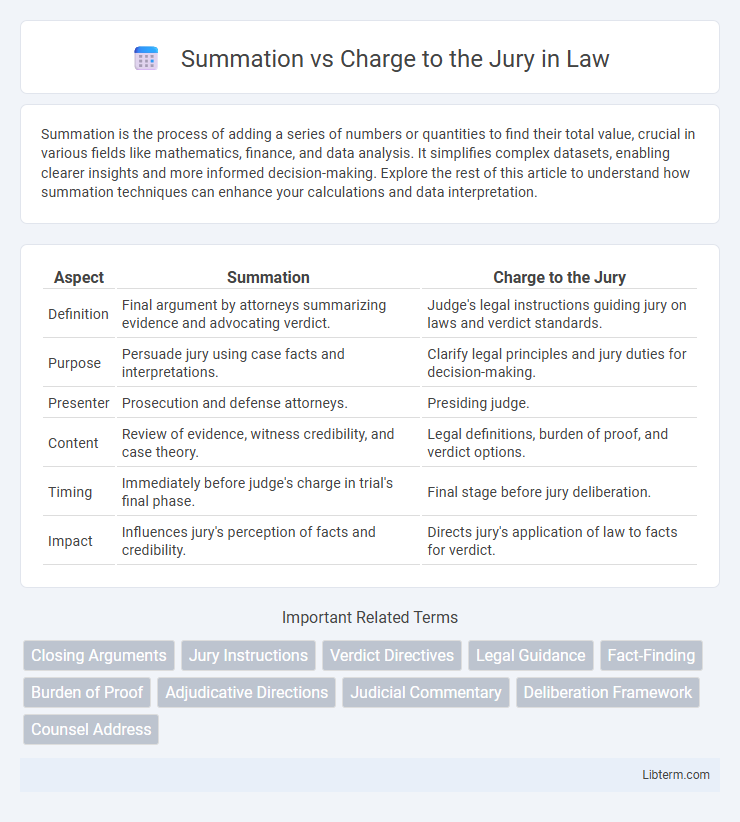Summation is the process of adding a series of numbers or quantities to find their total value, crucial in various fields like mathematics, finance, and data analysis. It simplifies complex datasets, enabling clearer insights and more informed decision-making. Explore the rest of this article to understand how summation techniques can enhance your calculations and data interpretation.
Table of Comparison
| Aspect | Summation | Charge to the Jury |
|---|---|---|
| Definition | Final argument by attorneys summarizing evidence and advocating verdict. | Judge's legal instructions guiding jury on laws and verdict standards. |
| Purpose | Persuade jury using case facts and interpretations. | Clarify legal principles and jury duties for decision-making. |
| Presenter | Prosecution and defense attorneys. | Presiding judge. |
| Content | Review of evidence, witness credibility, and case theory. | Legal definitions, burden of proof, and verdict options. |
| Timing | Immediately before judge's charge in trial's final phase. | Final stage before jury deliberation. |
| Impact | Influences jury's perception of facts and credibility. | Directs jury's application of law to facts for verdict. |
Introduction to Summation and Charge to the Jury
Summation is the final argument presented by attorneys before the jury begins deliberation, summarizing key evidence and legal points to persuade the jury toward a favorable verdict. The Charge to the Jury refers to the judge's instructions outlining the legal standards and criteria jurors must apply when evaluating the case. Understanding the distinct roles of summation and the jury charge is essential for grasping how verdicts are guided and influenced in trial proceedings.
Definition of Summation
Summation refers to the closing argument in a trial where attorneys review evidence and highlight key points to persuade the jury toward a favorable verdict. Unlike the charge to the jury, which is the judge's legal instruction outlining the law and standards members must apply when deliberating, summation is crafted by lawyers to frame the narrative of the case. Effective summations synthesize witness testimony, exhibits, and legal elements to reinforce the desired interpretation before the jury begins deliberations.
Definition of Charge to the Jury
Charge to the Jury is a formal instruction given by the judge that explains the relevant laws and legal standards jurors must apply when deliberating a case. Summation, in contrast, refers to the closing arguments made by attorneys summarizing evidence and advocating for their client's position. The Charge to the Jury ensures jurors understand their duties and legal criteria, guiding their verdict based strictly on law, not persuasion.
Purpose of Summation in Trials
Summation in trials serves to clarify and reinforce the key evidence and legal arguments presented, guiding the jury's understanding of complex facts and issues. It synthesizes testimony and exhibits, emphasizing the strengths of a party's case while addressing potential weaknesses. This final narrative aids the jury in applying the law accurately during the charge phase, ensuring a well-informed verdict.
Purpose of Charge to the Jury
The purpose of the charge to the jury is to provide clear legal instructions that guide jurors in applying the law to the facts of the case, ensuring a fair and consistent verdict. Unlike the summation, which is a persuasive closing argument summarizing evidence, the charge is an impartial explanation of legal standards and elements necessary for decision-making. This directive helps jurors understand their duties and the criteria for evaluating evidence, promoting justice in the trial process.
Key Differences Between Summation and Charge
Summation involves attorneys presenting their final arguments summarizing evidence, while the charge to the jury is the judge's detailed legal instruction outlining how to apply the law to the facts. The key difference lies in purpose: summation aims to persuade the jury by emphasizing facts, whereas the charge ensures jurors understand the legal standards and criteria for deliberation. Summation is advocacy-based and delivered by counsel, whereas the charge is impartial and given solely by the judge.
Role of Attorneys in Summation
Attorneys play a critical role in summation by synthesizing evidence and presenting persuasive arguments to clarify the case for the jury. They strategically highlight key facts and legal standards to reinforce their client's position before the judge delivers the charge. Effective summation ensures the jury understands the trial's narrative, influencing their evaluation prior to the judge's instructions on applicable laws.
Role of Judges in the Charge to the Jury
The Charge to the Jury is a critical judicial instruction provided by judges that outlines the legal standards and frameworks jurors must apply when deliberating on a case. Unlike summations delivered by attorneys, which advocate for one side, the judge's charge remains impartial, aiming to clarify the law and ensure jurors understand their duties. Judges play a pivotal role in framing the jury's deliberation by emphasizing applicable statutes, burden of proof, and the elements necessary for a verdict, thus safeguarding fair trial procedures.
Impact on Jury Decision-Making
Summation and Charge to the Jury serve distinct roles in jury decision-making, with summation providing attorneys an opportunity to emphasize evidence and frame narratives persuasively, directly influencing juror interpretation of facts. The Charge to the Jury, delivered by the judge, clarifies legal standards and outlines the burden of proof, ensuring jurors apply the law correctly. This combination shapes jurors' understanding, balancing emotional appeal and legal precision to impact verdict outcomes effectively.
Conclusion: Significance in the Justice Process
Summation and charge to the jury play crucial roles in the justice process by framing the final arguments and legal instructions that guide jury deliberations. Summation allows attorneys to emphasize key evidence and persuade the jury toward their interpretation of facts, while the charge provides authoritative legal standards essential for reaching a verdict. Together, these elements ensure that jurors make informed, legally grounded decisions, reinforcing the integrity and fairness of the trial outcome.
Summation Infographic

 libterm.com
libterm.com